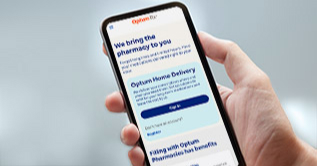Ask our doctors
Are you at risk for congestive heart failure?
Congestive heart failure (CHF) is when not enough blood is pumped through the heart. Learn what causes CHF and risk factors you should be aware of. Optum doctors offer education and tips to understand CHF and how to keep your heart healthy.
Heart health FAQ
Our cardiologists can help you create a health plan personalized to you that may include:
- Angioplasty (opening up arteries)
- Lifestyle changes
- Medicines
- Surgery, if needed
You should make an appointment if you have certain risk factors or symptoms. Common signs of a heart problem can include chest pain, high blood pressure or shortness of breath.
We care for all kinds of heart problems:
- Adult congenital heart disease (a heart problem someone is born with)
- Aortic disease
- Atrial fibrillation (a heart rhythm that’s not normal)
- Chest pain
- Coronary artery disease
- Family history of coronary disease
- Heart attacks
- High blood pressure, also known as hypertension
- Hypercholesterolemia and risk factor modification
- Irregular (not normal) heart beat
- Mitral valve prolapse
- Myocardial infarction
At Optum, we offer the following heart tests and more:
- Cardiac catheterization
- Cardiac stress test
- Cardioversions
- Echocardiogram (ECG)
- Holter monitoring
- Nuclear cardiology
- Pacemaker implantation and interrogation
- Resting electrocardiogram (ECG)
- RPM (remote patient monitoring) for heart failure
- Stress echocardiogram (stress echo)
- Transesophageal echocardiograms
Heart disease symptoms include:
- Chest pain or discomfort (angina)
- Leg swelling
- Palpitations (heart pounding, fluttering or not beating normally)
- Shortness of breath
If heart disease is not cared for, it can lead to a heart attack. Heart attack symptoms may include:
- Chest pain or discomfort
- Lightheadedness
- Nausea
- Pain in the arms, back, neck, jaw or stomach
- Shortness of breath
It’s important to seek medical help right away if you have any of these symptoms.
Cholesterol is a substance found in your blood. High levels of “bad” cholesterol (LDL) can lead to plaque buildup in your blood vessels. This can raise your chances of getting heart disease.
It’s important to make healthy life choices to help stop heart disease, including:
- Eating a heart-healthy, low-salt diet that includes whole grains, fruit and vegetables
- Getting exercise
- Handling stress levels
- Knowing your blood pressure, cholesterol and blood sugar levels
- Not smoking
- Seeing your doctor for yearly checkups
High blood pressure happens when the force of blood against your artery (blood vessels) walls is too high. High blood pressure can be managed with:
- A healthy weight
- Exercise
- Lifestyle changes, including a low-salt, heart-healthy diet that includes whole grains
- Medicine, if needed
A heart rhythm that isn’t normal isn’t life-threatening, but it can cause clots that lead to strokes. About 15 to 20% of people who have strokes have atrial fibrillation.**
It’s important to know the signs and symptoms of a stroke so you can get care right away. Here are the common signs and symptoms to look out for:
- Face drooping: One side of the face may droop or be numb. If you think someone is having a stroke, ask them to smile to see if one side of their face is drooping.
- Arm weakness: One arm may be weak or numb. Ask the person to raise both arms to see if one arm drifts downward.
- Problems with talking: Speech may be slurred, or the person may have trouble speaking or be hard to understand. Ask the person to repeat a simple sentence to see if they can do it.
- Time to call 911: If someone has any of these symptoms, call 911 right away, even if the symptoms go away. Every minute counts in getting care for a stroke.
Here are more symptoms of a stroke to look out for:
- Sudden numbness or weakness in the face, arm or leg, especially on one side of the body.
- Sudden confusion, trouble speaking or understanding speech.
- Sudden trouble seeing in one or both eyes.
- Sudden trouble walking, dizziness, loss of balance or lack of coordination (not being able to move in a normal way).
- Sudden severe headache, with no known cause, often described as the worst headache someone has ever had.
To help remember the signs of a stroke, use the term “FAST”:
- Face: Ask the person to smile. Does one side of the face droop?
- Arms: Ask the person to raise both arms. Does one arm drift downward?
- Speech: Ask the person to repeat a simple phrase. Is their speech slurred or strange?
- Time: If you see any of these signs, call 911 right away.
Helpful resources

Article
How to keep tabs on your blood pressure at home
Staying on top of your numbers can be a smart health step. Learn what to look for in a monitor and how to get readings you can trust.

Article
Know your LDLs and HDLs: What your cholesterol numbers really mean
Your body naturally makes cholesterol. But when you have too much LDL cholesterol (the “bad” kind) in your blood, it can cause problems.

Article
What to do after a heart attack: The first 5 things
Learn 5 important to-dos after a heart attack, straight from an Optum heart doctor.
*Cardiology services vary by location. Check with your doctor’s office or health plan for specific information.
**Heart.org. What is Atrial Fibrillation? Accessed March 6, 2025.
Optum arranges for or provides medical and other clinical services in accordance with laws in each state it operates. Physicians or providers referenced on this website are to those who are either part of independent practices or to those medical practices managed by or owned, where permitted, by Optum. In all circumstances, physicians and other licensed professionals have complete authority for all medical decision-making and patient care. Optum does not determine or set the methods, standards, or conduct of the practice of medicine or health care provided by any of the practices or their physicians or other licensed professionals.





